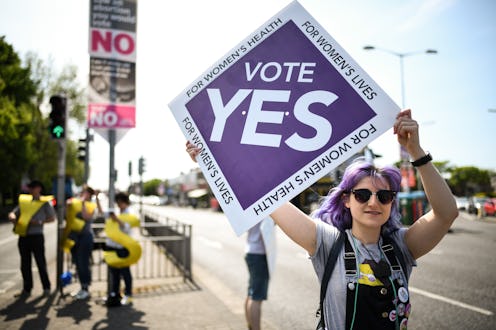News
How This Woman's Horrific Death Forced Ireland To Reckon With Its Dangerous Abortion Laws

Abortion is illegal at the constitutional level in Ireland, but that may not be the case for much longer. Irish citizens are casting their votes Friday on a nationwide referendum to repeal the country's abortion ban, and as the results trickle in, it's worth remembering how Savita Halappanavar's death catalyzed Ireland's abortion referendum all the way back in 2012.
A 31-year-old dentist from India, Halappanavar was 17 weeks pregnant when she began to experience intense back pain while in Ireland, according to The Guardian. After being admitted to a Galway hospital, physicians concluded almost immediately that she was going to miscarry, and she requested an abortion.
But she was refused. The Eighth Amendment to the Irish Constitution treats the life of a fetus as equal to the life of a mother, and the doctors detected a fetal heartbeat. Because hospital staff also determined — incorrectly — that Halappanavar's inevitable miscarriage posed no threat to her life, they refused to give her an abortion.
Three days later, she was diagnosed with sepsis due to complications stemming from the pregnancy, and again requested an abortion. The hospital again refused; Halappanavar's father told The Guardian that a doctor said, "This is a Catholic country — we cannot terminate because the fetus is still alive." Her mother responded that Halappanavar, who was at this point crying loudly in pain, was Hindu, and not an Irish citizen. Halappanavar's family said that she asked for an abortion three separate times, but was refused every time.
Halappanavar miscarried, then died from sepsis several days later. Her death prompted international outrage and an investigation by the Irish government.
The inquiry concluded that "the lack of clear clinical guidelines and training is considered to have been a material contributory factor" in Halappanavar's death, and that "similar incidents with a similar clinical context could happen again" without changes to — but not the outright elimination of — Ireland's abortion laws.
Halappanavar's death outraged pro-choice activists domestically and abroad, and in 2013, the country passed the Protection of Life During Pregnancy Act, which made abortion legal if the mother's life is deemed to be at risk, including from suicide.
And yet many criticized this as insufficient, because even under the new law, doctors face up to 14 years in prison if they "wrongfully" carry out an abortion. Moreover, abortion pills are still illegal in Ireland, and women who take them face the risk of prosecution for doing so. As a result, around 3,500 Irish women travel abroad to have abortions every year, according to The Guardian, while an additional 2,000 purchase abortion pills illegally and self-administer them without any medical supervision.
As such, the movement to repeal the Eighth Amendment continued to gather steam, with a 2016 pro-repeal rally drawing 20,000 attendees, according to Express. The next year, Ireland's newly-elected taoiseach announced that a referendum would be held on loosening the country's abortion laws, and in April, he encouraged voters to vote "yes" on repeal.
The vote is expected to be close, and thousands of Irish citizens living abroad have flown to their home country to cast votes.
In an interview with The Guardian on Wednesday, Halappanavar's father urged Irish citizens to vote yes on the referendum to repeal.
“I hope the people of Ireland remember my daughter Savita on the day of the referendum, and that what happened to her won’t happen to any other family,” Andanappa Yalagi told The Guardian. “It’s still very emotional after five years. I think about her every day. She didn’t get the medical treatment she needed because of the eighth amendment. They must change the laws."